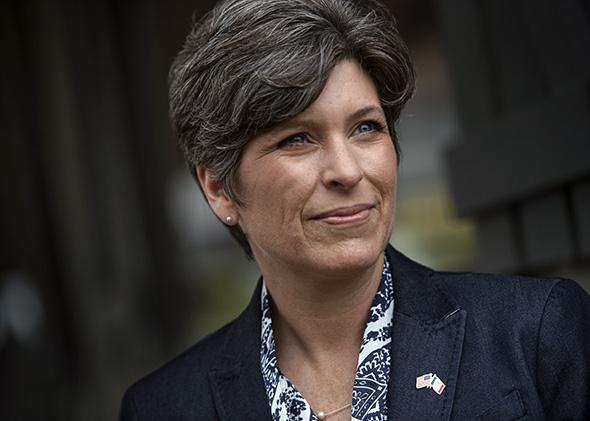If the Iowa Senate election were held today, Joni Ernst—the Republican nominee—would win. In the latest Des Moines Register poll, she leads by six points—44 percent to 38 percent for Democrat Bruce Braley.
Who is Ernst? An Iowa state senator, she’s served more than two decades in the Army Reserves and Iowa National Guard, and has held her state senate seat since 2011. By all appearances, she’s a mainstream Republican candidate, with support from Mitt Romney, Sarah Palin, the Chamber of Commerce, and a primary endorsement from the Des Moines Register, which called her “a smart, well-prepared candidate who can wrestle with the details of public policy from a conservative perspective without seeming inflexible.”
With that praise for her policy chops, you’d think Ernst was running a substantive campaign. She isn’t. Far from endorsing smart policy ideas or offering constructive solutions, Ernst is running on her biography, emphasizing her roles as “Mother. Soldier. Independent leader.” To that end, she had little to say about actual policy during Sunday night’s Senate debate. “We have to address those problems, and we need to look at many options out there—I haven’t endorsed one option or another,” she said.
There’s nothing new in bland, personality-driven campaigns. To some extent (remove the “bland”) it describes Barack Obama’s 2008 effort, and this year, it defines campaigns for red state Democrats who need to show their commitment to voters without alienating those on the fence.
The problem with Ernst, however, is that she does have policy ideas—and they are far, far outside the mainstream. So much so that she exists on the radical edge of the Republican Party, with polarizing views on almost everything under the sun. She’s not quite Sarah Palin part deux, but she’s close.
Take the minimum wage. Ernst is against the national minimum wage and believes it should be the full responsibility of the states. “I do believe that is something that needs to be set by the states, because our Iowa cost of living is very low,” she said during Sunday’s debate. “Currently it is at $7.25 an hour, and I’m someone that worked the minimum wage way back when, when it was much lower,” she said. From that, it’s a little unclear if she thinks $7.25 is appropriate for a minimum wage. An earlier comment, from August, is more clarifying. “I think $7.25 is a great starter wage for many high school students. They are just getting into work,” she said.
The problem is easy to see: Most minimum wage workers aren’t teenagers, and a substantial number have children of their own. Even in an inexpensive state like Iowa, $15,000 a year—the annual income for a full-time minimum wage worker—is below the poverty line for a family of four. What’s more, according to a survey from the liberal Center for American Progress, most Iowans disagree. Fifty-seven percent believe there should be a federal minimum wage, 53 percent support raising it to $10.10 an hour, and 80 percent agree the current minimum wage isn’t enough to support a family.
Beyond economic policy, Ernst has pandered to the far-right edges of Iowa politics. Indeed, notes Meredith Shiner for Yahoo News, she’s “in the precarious position of being an establishment-backed candidate who owes her shot at a national office to some of the most conservative voters in the country.”
Among other stances, Ernst has endorsed impeachment for President Obama, expressed the belief that states could nullify federal laws, and supported “personhood” anti-abortion laws that would outlaw most forms of contraception. In addition, she’s slammed Medicaid recipients for not taking “personal responsibility for their health”—even though recipients have to apply for coverage—and talked extensively about “Agenda 21,” a decades-old U.N. recommendation for environmental sustainability that forms the basis for conspiracy-mongering on the far right. “The United Nations has imposed this upon us, and as a U.S. senator, I would say, ‘No more. No more Agenda 21,’ ” she said during a January forum for GOP Senate candidates. Of all of Ernst’s positions, her most mainstream is support for private accounts in Social Security, which has intellectual respectability in the GOP, even as it’s opposed by most Americans.
Arguably, none of this matters. The Senate has become an almost parliamentary body, with lockstep unity on most issues. If elected to the Senate, Ernst would join with Sen. Mitch McConnell on almost every vote; that she happens to believe conspiracy theories doesn’t change the fact that she’s a Republican first and foremost.
But for as much as both sides walk in lockstep, individual senators still retain a tremendous amount of influence, from power over legislation and nominees to substantial media attention. A senator who wants to can bring an issue into the national conversation: Think Sen. Rand Paul and drone warfare, or Sen. Ted Cruz and his crusade against the Affordable Care Act. Above and beyond their party affiliation, it mattered that Paul was a libertarian and Cruz was an avatar for the Tea Party base.
A Joni Ernst who moves away from the far right of Iowa politics is one who might enter the Senate with sobriety in mind—a Sen. Tim Scott, not a Sen. Jim DeMint. But if she embraces these views, or feels indebted to the bomb-throwers and radicals, we’d have more than just another Republican senator—we’d have a destructive one.
